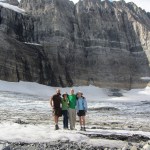melting
"Everybody knows that the dice are loaded
Everybody rolls with their fingers crossed
Everybody knows that the war is over
Everybody knows the good guys lost
Everybody knows the fight was fixed
The poor stay poor, the rich get rich
That's how it goes; everybody knows." -Leonard Cohen
As you know, last week I took my first week off of the year, and went on a trip to Glacier National Park, which was my very first time there. Although I've spent a lot of time in the mountains, including some pretty icy and snowy places, I'd never walked on an actual glacier before. All of that was about…
Some interesting goings-on in the cryosphere these days.
In this chart (click the link for an interactive, larger resolution version) from the cryosphere today we can see that we are on the 45th day in a row of daily record lows in sea ice area.
Note that this is area which is different from extent. Area refers to the actual ice cover, I am not sure of the details of how that is defined in practice, whereas extent refers to any ocean surface that contains 15% or more ice cover. Again, there will be technical details I am not familiar with for determining the edges of extent (e.g.…
Thingsbreak has a great overview of recent research on ice loss in the Antarctic (east and west) and Greenland.
For anyone who has had enough of the freedom vs responsibility of the press discussion (mandas?), perhaps there are some interesting bits in Thingsbreak's post to mull over.
I have posted on sea ice dynamics before (here), the two topics are not unrelated as stable ice shelves act as resistors to out flowing glaciers. Lost sea ice leads to faster glacial outflow which leads to thining ice sheets.
[Update: I have just observed out my window that it is snowing, I imagine this can…
Sure, astronomers might not call it a planet anymore, but every schoolchild knows how badass Pluto really is. It's got a giant moon, Charon, and two smaller ones, Hydra and Nix.
In addition to being colder than ice with an average temperature of 44 Kelvin (that's colder than liquid nitrogen), I'm here to bring you the news that despite the fact that it's so cold and so far from the Sun, Pluto has been melting!
Since its discovery by Clyde Tombaugh in 1930, astronomers have been fascinated with Pluto, making very careful observations of it, trying to learn more about this bizarre, icy sphere…


